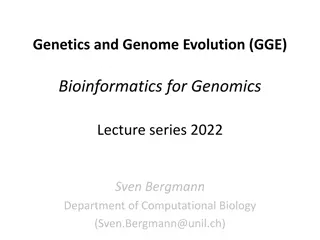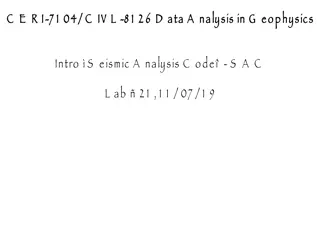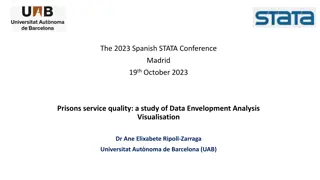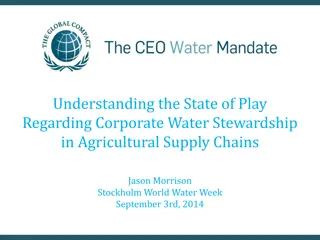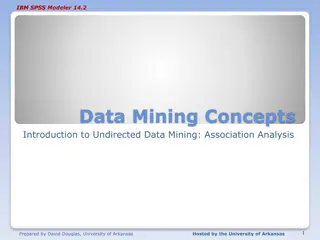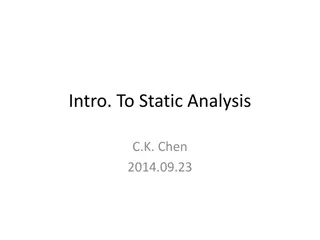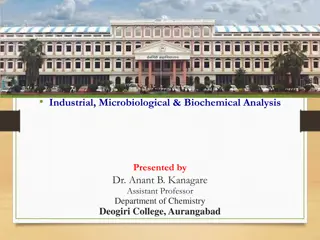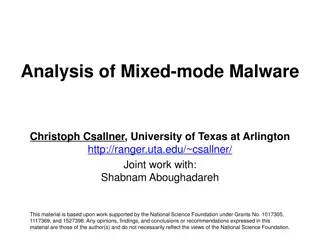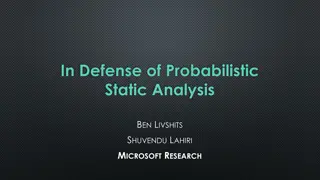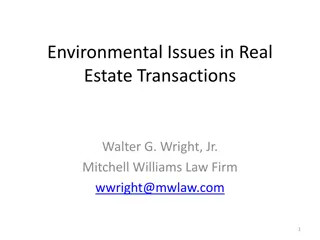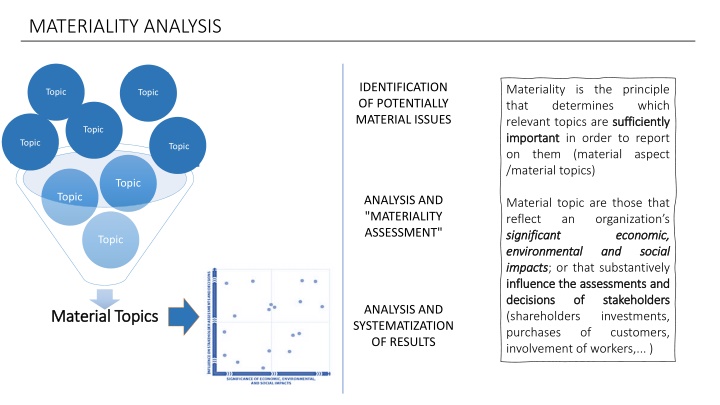
MATERIALITY ANALYSIS
Materiality analysis is crucial for identifying and reporting on significant environmental and social impacts that influence organizational decisions. Explore how BETA, an Italian multiutility company, conducts materiality assessments to address important sustainability issues such as ethical conduct, governance, human rights, and more.
Download Presentation

Please find below an Image/Link to download the presentation.
The content on the website is provided AS IS for your information and personal use only. It may not be sold, licensed, or shared on other websites without obtaining consent from the author. If you encounter any issues during the download, it is possible that the publisher has removed the file from their server.
You are allowed to download the files provided on this website for personal or commercial use, subject to the condition that they are used lawfully. All files are the property of their respective owners.
The content on the website is provided AS IS for your information and personal use only. It may not be sold, licensed, or shared on other websites without obtaining consent from the author.
E N D
Presentation Transcript
MATERIALITY ANALYSIS IDENTIFICATION OF POTENTIALLY MATERIAL ISSUES Materiality is the principle that determines relevant topics are sufficiently important important in order to report on them (material aspect /material topics) Topic Topic which sufficiently Topic Topic Topic Topic Topic ANALYSIS AND "MATERIALITY ASSESSMENT" Material topic are those that reflect an significant significant environmental environmental impacts impacts; or that substantively influence influence the the assessments assessments and decisions decisions of of (shareholders purchases of involvement of workers,... ) organization s economic, economic, and and Topic social social and stakeholders stakeholders investments, customers, ANALYSIS AND SYSTEMATIZATION OF RESULTS Material Topics Material Topics
BETA - MULTIUTILITY BETA is an Italian company, organised as a SpA, with public private shareholders BETA operates through five segments. The Energy segment covers electricity generation through hydroelectric and thermoelectric plants, energy management and sale of electricity and gas. The Heat and Services segment facilitates the management of heating plants, as well as distribution of heat in numerous municipalities, production and sale of electricity, and maintenance activities at the cogeneration plants. The Environment segment includes waste disposal, street cleaning and waster recovery, among others. The Networks segment encompasses transmission, distribution of electricity, transportation, distribution of natural gas, and water distribution, among others. The Corporate and other services segment include traffic regulation systems and video surveillance systems, among others. The company has significant presence in the North of Italy, energy production facilities in Italy and Greece. BETA is a multiutility strongly integrated in the territories, it has a local heart but global ambitions. 12,000 employees
BETAS MATERIALITY ANALYSIS IDENTIFICATION OF POTENTIALLY MATERIAL ISSUES
Ethical conduct in the management of business (adoption of non-competitive behaviour, anti-corruption policies, compliance with laws and regulations, adhesion to the main national and international social and environmental agreements); promotion of specific mechanisms and procedures for reporting irregularities and unlawful conduct, also related to anti-corruption. Ethical conduct Ethical conduct Introduction and development of sustainability elements in corporate governance. Integration of sustainability objectives in incentive systems (correlation between Management remuneration - MbO; and Sustainability KPIs) Sustainability in Governance Sustainability in Governance Adoption of a Group approach that integrates, within the company strategy, the analysis and management of risks and opportunities in relation to sustainability issues (environmental and social Sustainability risks and Sustainability risks and opportunities opportunities Promotion and respect of human rights throughout the value chain (suppliers, employees, customers). Promotion of access to electricity, gas and water services by disadvantage categories of consumers. Human Rights Human Rights Promote redistribution to Group stakeholders of the economic value generated, the enhancement of environmental and social aspects to consolidate relations with the financial community, the ability to attract new investors sensitive to sustainability Sustainable economic value Sustainable economic value Promote redistribution to Group stakeholders of the economic value generated, the enhancement of environmental and social aspects to consolidate relations with the financial community, the ability to attract new investors sensitive to sustainability Efficient infrastructure Efficient infrastructure management management Valorization of waste as a resource, from collection to disposal, favouring, where possible, the recovery of materials, the minimization of waste sent to landfills, also thanks to waste-to-energy; development of separate waste collection, efficient management of landfills, sludge and waste water, also through the adoption of biogas production technologies Circular economy Circular economy Reducing water leaks along the distribution network and adopting policies and best practices that facilitate the careful and sustainable consumption of water resources. Efficient water use Efficient water use Promotion of strategies to reduce atmospheric emissions and develop renewable energies; development of energy efficiency initiatives in the Group plants and sites and in final uses, such as: district heating, LED lighting and commercial offers linked to the sale of renewable energy and value added services. Combating climate change Combating climate change Safeguarding the landscape heritage and the territories in which the Group's plants or sites are present, also thanks to analyses and monitoring with a view to minimizing the impacts on biodiversity and the most important habitats. Biodiversity Biodiversity
Efficient management and consumption of water resources with specific reference to the biological, chemical and physical quality of the water distributed in the various municipalities served by the Group. Quality of distributed water Quality of distributed water Increasing the efficiency of transport and logistics in everyday operations, with specific reference to limiting the noise and emissions in residential areas during waste collection operations; development of infrastructures to promote new electric and sustainable mobility. Sustainable mobility Sustainable mobility Promotion of practices and systems for the management of health and safety at work, the monitoring of incidents and prevention measures, also through dedicated training, for both employees and contractors. Occupational health and safety Occupational health and safety Promotion of professional development and attraction and retention of talents; creation of development and training opportunities aiming to strengthen technical, managerial and organizational skills of employees; activation of systematic systems for listening to employees, promoting dialogue and collaboration initiatives. Development of human capital Development of human capital Commitment to the development of an inclusive culture and work environment, valuing the principle of equal treatment of all colleagues based on professional skills and abilities. Development and promotion of n integrated approach to human resources management, through appropriate practices and working conditions to ensure equal opportunities for all employees in all forms. Diversity and inclusion Diversity and inclusion Policies to promote the personal, family and work well-being of employees that, also through income support initiatives, are aimed at optimizing the reconciliation of private and professional life, fostering engagement, improving the work environment and developing a culture of well-being. Corporate welfare Corporate welfare Optimize Group competences and know-how through research and development activities that stimulate a continuous evolution of services and infrastructures, contributing towards the development and creation of the Smart City of the future, which integrates all energy, environment, water, heat, networks and optic fibre services in a single centre. Innovation and smart cities Innovation and smart cities Ensure safety and reliability in the provision of services and development of emergency management plans aimed at preventing and/or mitigating potential external factors that could compromise the continuity of services. Responsibility and Safety in the Responsibility and Safety in the provision of services and products provision of services and products Promotion of high quality services and the ability to meet customer expectations through good communication and marketing practices (including data protection) and new digital services. Quality and innovation in the Quality and innovation in the provision of services and products provision of services and products
Promotion of high quality services and the ability to meet customer expectations through good communication and marketing practices (including data protection) and new digital services. Relationship Relationship stakeholders stakeholders with with Group Group Sensitisation of the local community to a responsible use of resources, energy and the importance of reusing materials so as to minimize waste; promotion of environmental education initiatives, of active citizenship and knowledge of Group activities, including through the organization of tours to plants. Environmental Environmentaleducation education Adoption of supplier, collaborator and commercial partner selection policies applying fair and transparent processes that integrate sustainability criteria; promotion of social responsibility practices amongst suppliers, stimulating the improvement to reliability and safety in provision of services. Responsible Responsible management management of of the supply supplychain chain the Scroll through the list of topics and share your comments 1 - does it seem complete to you? 2 - Would you add something? 3 - Would you delete something? 4 - Would you give a different description of one or more topics?
BETAS MATERIALITY ANALYSIS ANALYSIS AND "MATERIALITY ASSESSMENT"
1. Ethical conduct 1. Ethical conduct 2. Sustainability in Governance 2. Sustainability in Governance 3. Sustainability risks and opportunities 3. Sustainability risks and opportunities 4. Human Rights 4. Human Rights 5. Sustainable economic value 5. Sustainable economic value 6. Efficient infrastructure management 6. Efficient infrastructure management 7. Circular economy 7. Circular economy Imagine being a stakeholder, assign a score from 1 to 5 to the identified topics. 8. Efficient water use 8. Efficient water use 9. Combating climate change 9. Combating climate change 10. Biodiversity 10. Biodiversity Please consider 1 as the minimum score and 5 as the maximum score 11. Quality of distributed water 11. Quality of distributed water 12. Sustainable mobility 12. Sustainable mobility A A topic topic is is relevant influences influences your decisions decisionstowards relevant if if it it substantively substantively your assessments assessments and towardsthe theCompany Company 13. Occupational health and safety 13. Occupational health and safety and 14. Development of human capital 14. Development of human capital 15. Diversity and inclusion 15. Diversity and inclusion 16. Corporate welfare 16. Corporate welfare 17. Innovation and smart cities 17. Innovation and smart cities 18. Responsibility and Safety in the provision of services and products 18. Responsibility and Safety in the provision of services and products 19. Quality and innovation in the provision of services and products 19. Quality and innovation in the provision of services and products 20. Responsible management of the supply chain 20. Responsible management of the supply chain
1. Ethical conduct 1. Ethical conduct 2. Sustainability in Governance 2. Sustainability in Governance 3. Sustainability risks and opportunities 3. Sustainability risks and opportunities 4. Human Rights 4. Human Rights 5. Sustainable economic value 5. Sustainable economic value 6. Efficient infrastructure management 6. Efficient infrastructure management 7. Circular economy 7. Circular economy Imagine being a manager of the Beta company, assign a score from 1 to 5 to the identified topics. 8. Efficient water use 8. Efficient water use 9. Combating climate change 9. Combating climate change 10. Biodiversity 10. Biodiversity Please consider 1 as the minimum score and 5 as the maximum score 11. Quality of distributed water 11. Quality of distributed water 12. Sustainable mobility 12. Sustainable mobility A A topic topic is is relevant organization s organization s significant environmental environmental and relevant if if reflects significant economic, andsocial social impacts reflects the economic, impacts the 13. Occupational health and safety 13. Occupational health and safety 14. Development of human capital 14. Development of human capital 15. Diversity and inclusion 15. Diversity and inclusion 16. Corporate welfare 16. Corporate welfare 17. Innovation and smart cities 17. Innovation and smart cities 18. Responsibility and Safety in the provision of services and products 18. Responsibility and Safety in the provision of services and products 19. Quality and innovation in the provision of services and products 19. Quality and innovation in the provision of services and products 20. Responsible management of the supply chain 20. Responsible management of the supply chain
BETAS MATERIALITY ANALYSIS ANALYSIS AND SYSTEMATIZATION OF RESULTS
Lets build the materiality matrix!! https://www.menti.com/3cdstiscs3




